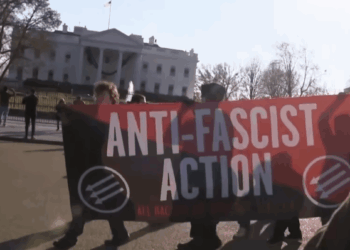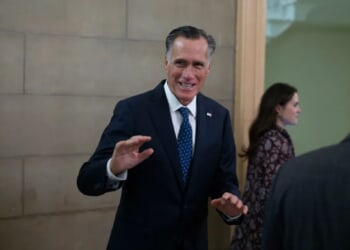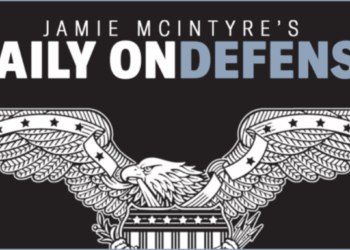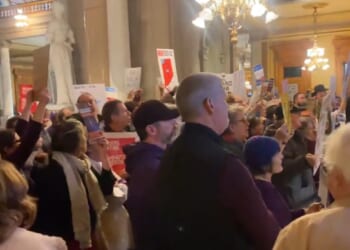In Focus delivers deeper coverage of the political, cultural, and ideological issues shaping America. Published daily by senior writers and experts, these in-depth pieces go beyond the headlines to give readers the full picture. You can find our full list of In Focus pieces here.
Despite all the uproar surrounding the ascension of socialist star Zohran Mamdani to mayor-elect of the largest city in America, democratic socialism’s capture of city government, not just New York City’s, is years in the making.
Scores of candidates backed by the country’s de facto socialist party, the Democratic Socialists of America, have wooed their way into local office with similar promises of government-run grocery stores, free childcare, fareless public transportation, and rent freezes.
Notably, a third of the 12-person Portland City Council are active DSA members, all of whom assumed office in January. There, the “socialists are setting the agenda.”
Councilor Mitch Green, one-fourth of the socialist quartet, told Willamette Week that he is not beholden to the DSA’s desires, nor does the DSA give Greene “marching orders,” but the organization wields great influence over him.
“Their intention was to never organize to get me in office and then walk away,” Green said. “I haven’t experienced this yet, but the expectation is that if I do something way out of line with the values of the organization, I’m going to hear about it.”
The four councilors are expected to abide by the Portland DSA’s candidacy requirements. As part of these obligations, they must meet monthly with the chapter’s Socialists in Office committee, a standing appointment that no other external group has at City Hall.
“We want to put someone in office who is going to bring DSA with them to office,” Olivia Katbi, co-chair of the Portland DSA, told Willamette Week. “Our councilors are DSA. So what they are doing is DSA, until further notice, unless we say it’s not.”
Socialists gain ground in city government
Beyond ultra-progressive Portland, the DSA is gradually growing its influence in local government, picking up seats on city councils and county boards elsewhere each election cycle.
This off-year election season, more than a dozen democratic socialists won their respective races in various jurisdictions across the country.
Beyond Mamdani, Twin Cities newcomer Soren Stevenson secured the title of councilman, bringing the total number of democratic socialists on the 13-member Minneapolis City Council to four.
Stevenson’s decisive victory coincided with the reelection of three DSA-endorsed city councilors: Robin Wonsley, who ousted a 14-year incumbent back in 2021, Jason Chavez, and Aisha Chughtai.
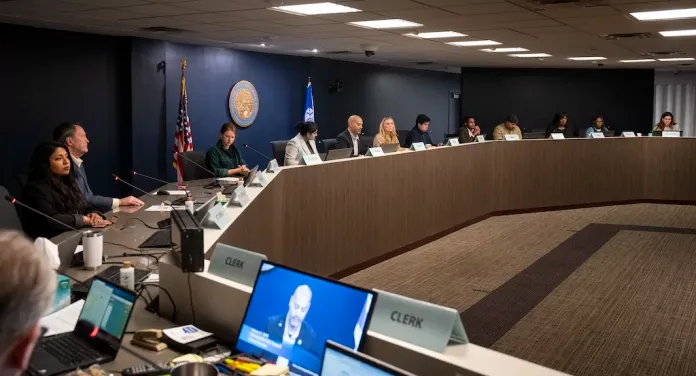
Twin Cities DSA applauded the election results, which were boosted by the chapter’s citywide outreach efforts.
“We are proud as a chapter to have supported all our endorsed campaigns by filling 1,100 door knocking and phone banking shifts across the largest slate of candidates we have ever endorsed,” Twin Cities DSA co-chair Brooke Bartholomew said in a statement shared with the Washington Examiner.
Bartholomew added, “We look forward to working with our elected members to push a working-class agenda.”
Atlanta will have its first democratic socialist on the city council. Kelsea Bond, the far-and-away winner in her district’s wide-open contest for a spot on the Georgia capital’s governing body, beat out four others by capturing 64% of the vote.
Denzel McCampbell, formerly the communications director for Rep. Rashida Tlaib (D-MI), became the second democratic socialist to join the Detroit City Council. While campaigning, McCampbell and current Councilwoman Gabriela Santiago-Romero, a self-described democratic socialist, teamed up on social media in hopes of forming a socialist alliance.
Milwaukee Alderman Alex Browser, co-chair of the city’s DSA chapter, successfully defended his seat. Browser had won an earlier Milwaukee Common Council special election in April after a death left his district’s seat vacant. “I am bringing back sewer socialism to Milwaukee City Hall,” Browser said at the time on becoming one of the first socialists in City Hall since the 1960s.
DSA’s wins were not confined to urban sprawl. In Carrboro, a small-ish college town situated near the University of North Carolina’s flagship Chapel Hill campus, Councilman Danny Nowell of the DSA’s N.C. Triangle coalition kept his uncontested seat. In eastern New York, Mid-Hudson Valley DSA co-chair Daniel Atonna had handily claimed an opening on the Poughkeepsie Common Council, winning twice the votes than that of his Republican contender.
SOCIALIST CANDIDATES CRUISED TO VICTORY IN A DOZEN RACES
Several democratic socialists came close to clinching office. Somerville City Councilor Willie Burnley Jr. of the Boston DSA was bested by a slight margin in his mayoral bid. Maryah Lauer, co-founder of Colorado Springs DSA, narrowly lost the April municipal race for city council, coming in second—by about 515 votes—out of a crowded field of five hopefuls in her district.
As of 2025, there are over 250 democratic socialists in public office, 90% of whom were elected after 2019. This count includes 96 city councilors and county commissioners, or the equivalent of, and eight mayors, county executives, and town supervisors.
Most of them hail from Democratic strongholds, such as California, New York, Minnesota, and Washington, D.C. In the largest U.S. cities, four democratic socialists currently sit on the 15-seat Los Angeles City Council, four on the 51-seat New York City Council, and seven on the 50-seat Chicago City Council, including one alderman added as recently as April by appointment of Mayor Brandon Johnson. Though they make up a small share of Chicago’s legislative body, the bloc of DSA members have formed an official Democratic Socialist Caucus.
Of the handful holding office in red states, they represent reliably blue municipalities—for instance, St. Petersburg City Councilman Richie Floyd in Florida, Gabriela Biro of the New Orleans School Board in Louisiana, and Austin City Council member Mike Siegel in Texas, to name a few.
Party crashers: A hostile takeover or a welcomed alliance?
DSA, which is organized as a 501(c)(4) nonprofit, is not a political party with a ballot line. That’s by design.
Peter Dreier, co-editor of We Own the Future: Democratic Socialism―American Style, said that DSA “accepts the reality of a two-party system” and aims to work within the Democratic Party to shift it further to the political left.
“Becoming a fringe third-party, which is what it would become if it created its own party, would be counterproductive,” Dreier told the Washington Examiner.
THE SOCIALIST FUTURE OF THE DEMOCRATIC PARTY IS HERE
“Electoral tactics are only a means for democratic socialists; the building of a powerful anti-corporate coalition is the end,” DSA said in a 2012 strategizing document. According to the roadmap, titled “Where We Stand,” socialists largely see the Democratic Party as “the key political arena in which to consolidate this coalition.”
Some aggrieved Democrats are not as willing to embrace DSA’s entryism into the Democratic Party, especially at the ballot box in cases where socialists win elections to the detriment of Democratic candidates.
During the 2021 Democratic primary for Buffalo mayor, DSA-backed India Walton defeated four–term incumbent Byron Brown in a stunning upset that kicked him off the Democratic ticket. Brown, however, went on to win the general election against Walton as a write-in candidate.
On the campaign trail, Brown framed the match-up as a moderate Democrat fending off a far-left challenger. When they debated, Brown said, “I don’t see Ms. Walton as a Democrat.” To which, Walton countered, “I won the Democratic primary. Secondly, I am a self-avowed democratic socialist. The first word in that is Democrat.” Upon winning a fifth and final term, Brown claimed that his comeback story symbolized “a rebuke of socialism.”

Also at play for the broader Democratic base, aside from grievances over a DSA pick primarying the Democratic establishment’s candidate of choice, is a concern that a socialist who wins the Democratic Party’s nomination might lose to a more formidable Republican rival and end up costing the ticket the election.
This skepticism, coupled with hostility from some Democrats, raises the question of whether there is room in the Democratic Party for socialists.
Red rising
Democratic socialism’s popularity appears to be exponentially growing, evidenced by the wave of electoral triumphs at the local level. High-profile campaigns associated with DSA, likewise, have helped the group’s growth.
DSA membership ballooned following the 2016 and 2020 presidential bids of Sen. Bernie Sanders (I-VT), a noted democratic socialist, although not an official DSA member. The movement’s numbers surged from a mere 6,200 members in 2015 to 32,000 in 2017, peaking at 95,000 strong in 2021, according to a Growth and Development Committee report to the DSA National Convention.
DSA darling Rep. Alexandria Ocasio-Cortez (D-NY) unseating longtime Congressman Joe Crowley, then-chair of the House Democratic Caucus, in the 2018 midterm primaries reportedly inspired 1,000 new members to join DSA the next day, about 35 times the daily sign-up average.
Mamdani’s meteoric rise is now renewing national attention to socialism’s sway, namely over young Democrats, and shining a spotlight on its increasing acceptance among Americans.

A nationwide Cato/YouGov survey from March found that nearly two-thirds (62%) of American adults under the age of 30 support socialism or at least view it favorably. The younger the age group surveyed, the more likely they feel favorable toward socialism. This held true for those who leaned left, as 67% of Democrats surveyed said they have a positive opinion of socialism.
The poll, which took the sample size’s temperature on U.S. fiscal policy, did not define socialism so it is unclear whether the respondents were answering from an economic standpoint, with regards to social welfare programs; through a historical lens; or assessing it ideologically.
“Socialism is not one thing,” said Dreier, a political science professor at Occidental College. “It’s a set of ideas, policies bigger than DSA that people can like or not like. A lot of people who would never call themselves socialists agree with socialist ideas or ones considered socialist.”
But because a policy is seen as socialist, some people are afraid to be put in that category, Dreier explained. He said history has shown that public opinion changes over time toward purportedly socialist policies; it took decades for many concepts, once regarded as revolutionary, to become more mainstream.
At one point, people called women’s right to vote a radical notion, Dreier noted. So did society say of labor unions. Social Security, when President Franklin D. Roosevelt first proposed it in 1934, was derided as an un-American socialist scheme. Today, people of all political stripes, including conservatives, want to protect the old-age benefits program from budget cuts.
“The radical ideas of one generation are the common sense of the next,” Dreier quipped.



